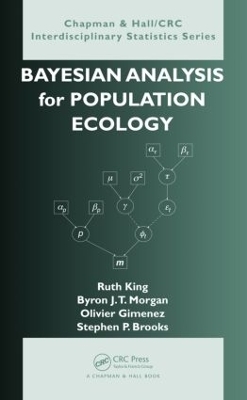
Bayesian Analysis for Population Ecology
Seiten
2009
Chapman & Hall/CRC (Verlag)
978-1-4398-1187-0 (ISBN)
Chapman & Hall/CRC (Verlag)
978-1-4398-1187-0 (ISBN)
Emphasizing model choice and model averaging, this book presents Bayesian methods for analyzing complex ecological data. It provides a basic introduction to Bayesian methods that assumes no prior knowledge. It includes descriptions of methods that deal with covariate data and covers techniques at the forefront of research.
Novel Statistical Tools for Conserving and Managing Populations
By gathering information on key demographic parameters, scientists can often predict how populations will develop in the future and relate these parameters to external influences, such as global warming. Because of their ability to easily incorporate random effects, fit state-space models, evaluate posterior model probabilities, and deal with missing data, modern Bayesian methods have become important in this area of statistical inference and forecasting.
Emphasising model choice and model averaging, Bayesian Analysis for Population Ecology presents up-to-date methods for analysing complex ecological data. Leaders in the statistical ecology field, the authors apply the theory to a wide range of actual case studies and illustrate the methods using WinBUGS and R. The computer programs and full details of the data sets are available on the book’s website.
The first part of the book focuses on models and their corresponding likelihood functions. The authors examine classical methods of inference for estimating model parameters, including maximum-likelihood estimates of parameters using numerical optimisation algorithms. After building this foundation, the authors develop the Bayesian approach for fitting models to data. They also compare Bayesian and traditional approaches to model fitting and inference.
Exploring challenging problems in population ecology, this book shows how to use the latest Bayesian methods to analyse data. It enables readers to apply the methods to their own problems with confidence.
Novel Statistical Tools for Conserving and Managing Populations
By gathering information on key demographic parameters, scientists can often predict how populations will develop in the future and relate these parameters to external influences, such as global warming. Because of their ability to easily incorporate random effects, fit state-space models, evaluate posterior model probabilities, and deal with missing data, modern Bayesian methods have become important in this area of statistical inference and forecasting.
Emphasising model choice and model averaging, Bayesian Analysis for Population Ecology presents up-to-date methods for analysing complex ecological data. Leaders in the statistical ecology field, the authors apply the theory to a wide range of actual case studies and illustrate the methods using WinBUGS and R. The computer programs and full details of the data sets are available on the book’s website.
The first part of the book focuses on models and their corresponding likelihood functions. The authors examine classical methods of inference for estimating model parameters, including maximum-likelihood estimates of parameters using numerical optimisation algorithms. After building this foundation, the authors develop the Bayesian approach for fitting models to data. They also compare Bayesian and traditional approaches to model fitting and inference.
Exploring challenging problems in population ecology, this book shows how to use the latest Bayesian methods to analyse data. It enables readers to apply the methods to their own problems with confidence.
Ruth King is a reader in statistics at the University of St. Andrews and a former EPSRC post-doctoral Research Fellow. Byron J.T. Morgan is a professor of applied statistics at the University of Kent and co-director of the EPSRC National Centre for Statistical Ecology. Olivier Gimenez is a research scientist in biostatistics at CNRS and a former Marie Curie research fellow. Stephen P. Brooks is director of research at ATASS Ltd and a former professor of statistics at the University of Cambridge and EPSRC Advanced Fellow.
Introduction to Statistical Analysis of Ecological Data. Bayesian Techniques and Tools. Ecological Applications. Appendices. References. Index.
| Erscheint lt. Verlag | 12.11.2009 |
|---|---|
| Reihe/Serie | Chapman & Hall/CRC Interdisciplinary Statistics |
| Zusatzinfo | 66 Tables, black and white; 93 Illustrations, black and white |
| Sprache | englisch |
| Maße | 156 x 234 mm |
| Gewicht | 840 g |
| Themenwelt | Naturwissenschaften ► Biologie ► Botanik |
| Naturwissenschaften ► Biologie ► Ökologie / Naturschutz | |
| Weitere Fachgebiete ► Land- / Forstwirtschaft / Fischerei | |
| ISBN-10 | 1-4398-1187-3 / 1439811873 |
| ISBN-13 | 978-1-4398-1187-0 / 9781439811870 |
| Zustand | Neuware |
| Informationen gemäß Produktsicherheitsverordnung (GPSR) | |
| Haben Sie eine Frage zum Produkt? |
Mehr entdecken
aus dem Bereich
aus dem Bereich
Gefäßpflanzen: Grundband
Buch | Hardcover (2021)
Springer Spektrum (Verlag)
44,99 €
Diversität, Morphologie, Ökologie und Evolution der Pilze
Buch | Softcover (2023)
Springer (Verlag)
49,99 €
ein Baum erzählt seine erstaunliche Geschichte
Buch | Hardcover (2024)
Ludwig (Verlag)
23,00 €


